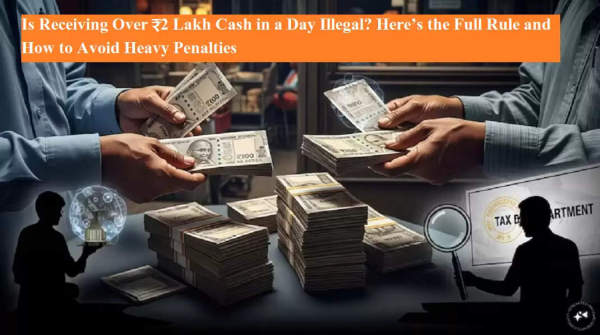
India’s tax laws strictly limit how much cash a person or entity can accept in a single day — and breaking that rule can be costly. Under Section 269ST of the Income-tax Act, accepting ₹2 lakh or more in cash in one transaction, from one person in a day, or linked to the same occasion can trigger severe penalties. This article explains what the law says, who is responsible, what penalties apply, common exceptions, and practical ways to stay compliant.
What Section 269ST says — the rule in simple terms
Section 269ST prohibits any individual, Hindu Undivided Family (HUF), company, firm or other entity from accepting ₹2,00,000 or more in cash:
-
In a single transaction, or
-
In multiple transactions that are related to the same event or occasion, or
-
From the same person on the same day.
That means whether you run a shop, do freelance work, or handle a one-off payment for services or property, you must ensure cash receipts don’t cross the ₹2 lakh threshold in the situations described.
Who bears the responsibility?
Crucially, the responsibility to comply falls on the person who is receiving the cash, not on the payer. If you accept more than the permitted amount — even if the payer hands the cash with honest intentions — you are the one liable for penalties. This makes it especially important for businesses and professionals to implement clear cash-acceptance processes.
What penalty can be imposed?
If Section 269ST is violated, the tax department has the authority to impose a penalty equal to the entire amount of cash accepted in violation of the provision. For example, if a business accepts ₹3 lakh in cash for a sale and the transaction is flagged, the penalty could be the full ₹3 lakh. The consequence is effectively a complete forfeiture of the excess cash and can be financially crippling.
Common scenarios that trip people up
-
A shopkeeper accepting multiple payments from the same customer on the same day that cumulatively exceed ₹2 lakh.
-
Property or vehicle deals where buyers try to pay a large portion in cash.
-
Event organizers taking many small cash payments for the same event that together cross the limit.
Because the law looks at the aggregate cash received from a person on the same day or for the same occasion, splitting a transaction into multiple smaller amounts won’t provide legal safety if it’s clearly linked.
Exceptions — when the rule does not apply
Section 269ST does not apply in certain circumstances, such as:
-
Cash receipts by banks, post offices, or government entities acting in an official capacity.
-
Transactions where cash is received for certain specified categories that the law exempts (check latest official guidance for full details).
How to avoid penalties — safe alternatives and best practices
-
Prefer banking channels: Use NEFT, RTGS, UPI, IMPS, cheques or demand drafts for large payments. These leave a clear audit trail and avoid the cash limit entirely.
-
Train staff and update billing systems to flag aggregated receipts from the same payer on the same day.
-
For high-value sales (property, cars, business deals), specify electronic payment or escrow arrangements in contracts.
-
If a customer insists on cash, request identification and verify whether accepting the amount would breach the ₹2 lakh rule — and politely refuse or suggest electronic alternatives.
-
Keep transparent records — timestamps, invoices, and bank deposit slips — to demonstrate compliance if questioned.
Takeaway: Don’t let cash cost you more than you think
Accepting more than ₹2 lakh in cash in one of the prescribed situations is risky and can lead to heavy penalties equal to the amount received. The safest path is to adopt non-cash payment methods for large sums, maintain clear records, and ensure your business processes prevent accidental breaches. If you often handle large transactions, consult a tax professional to design compliance-friendly payment policies.
-
Typhoon Matmo Impact: Heavy Winds Almost Swept Away Man With His Door; Viral Video Sparks Scare

-
Sudden cardiac death: Why do people die suddenly from heart attacks? Learn more and be vigilant now

-
South Korea: Highways partially congested on Chuseok holiday

-
South Korea: Highways partially congested on Chuseok holiday

-
NTPC Bongaigaon Extends Support to Young Football Talent from Salakati-Revised
